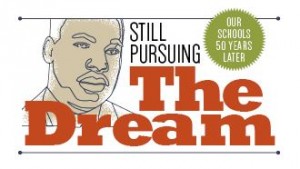
Editor’s note: This is the second in our series of posts commemorating the 50th anniversary of Dr. King’s “I Have a Dream” speech. Darrell Allison is president of Parents for Educational Freedom in North Carolina.
Is school choice the civil rights issue for the 21st Century? I say it’s always been an issue.
While the battles, faces, and nuances have changed, we are still wrestling with core questions of equality, education as a means of opportunity, and creating a just society.
On Feb. 1, 1960, four young men from North Carolina Agricultural and Technical State University, Ezell Blair, Joseph McNeil, Franklin McCain, and David Richmond, were refused service at a lunch counter in Greensboro, N.C. because of the color of their skin. In response, they turned the nation’s attention to injustice and inequality by remaining in their seats until closing time. The sit-in continued the following day; pretty soon, after significant media attention, sit-ins were happening elsewhere in North Carolina and in cities across the South.
In 2013, four courageous young men followed in their footsteps by bringing attention to educational injustice to the North Carolina legislature. Reps. Marcus Brandon and Ed Hanes (both Democrats), and Brian Brown and Rob Bryan (both Republicans), each took political hits and overcame harsh rhetoric as they jointly sponsored The Opportunity Scholarship Act.
Opportunity Scholarships give students from low-income and working-class families the ability to attend non-public schools that could better meet their needs. The hard reality is, not much has changed since the 1960s when it comes to educational choices. Wealthy parents have always had access to an array of options that many lower-income, mostly minority students do not. This was the justification behind Opportunity Scholarships – to provide the same equality of choice to poor families.
As Dr. King once said, “Injustice anywhere is a threat to justice everywhere … whatever affects one directly, affects all indirectly.” In North Carolina, we have a 30 percentage point achievement gap between non-poor and economically disadvantaged students, a 30 point gap between whites and blacks, and a 24 point gap between whites and Hispanics. If we treat Dr. King’s quote as truth and not a catchy saying, where is the moral outrage?
These statistics reveal a great divide – one that Brown v. Board of Education sought to address in 1954. The landmark case recognized segregation in public education was wrong. However, I contend that Brown v. Board was not simply and narrowly about placing black kids in classrooms with white kids. It was, at its very core, a school choice issue because one of its underlying premises was the quality of education was not the same for minority students compared to their white counterparts.
In the schools attended by white children, the quality of education – classrooms, textbooks, facilities, everything – was visibly superior compared to the schools that minority children attended. Isn’t this the same case today? Even today, the schools many wealthy parents send their children to have resources and offer opportunities that are not available to the children of our poorer parents. Brown v. Board was about ensuring ALL families, regardless of race, income and zip code, had access to a quality education. That was worth fighting for then, and is still worth fighting for today.
Even in our most ethnically diverse schools, we’re still finding poor and minority kids at the statistical bottom. Social integration in our classrooms is important. But I think we all can agree that this wasn’t the ultimate goal of Brown v. Board then, and we should not allow such today.
“I have a dream that my four little children will one day live in a nation where they will not be judged by the color of their skin but by the content of their character.”
These powerful words spoken by Dr. Martin Luther King Jr. still resonate half a century later. King’s grandchildren might not be denied access to basic freedoms based on the color of their skin. But they may be denied access to educational options based on their zip code.
The passage of Opportunity Scholarships is recognition of North Carolina’s constitutional promise to provide a sound, basic education to all students. When certain populations of students are underserved year after year, change is necessary to keep this promise. There will be fear of change, just as in 1964 when President Lyndon Johnson signed the Civil Rights Act. But bold leaders fought for change then, in the face of adversity and injustice, just as bold leaders are fighting for change today.
Four young men, greatly influenced by Dr. King, sat down at a North Carolina lunch counter in 1960. Over fifty years later, four young lawmakers, also greatly influenced by Dr. King, successfully led efforts to create a life-changing school choice program in the same state. I believe there could be no better way to celebrate the 50-year anniversary of the “I Have A Dream” speech.
Coming tomorrow: A post from Peter Hanley, executive director of the American Center for School Choice.



I have to wonder about the author’s definition of “creating a just society”. Although NC has made progress in it’s “promise to provide a sound, basic education to all students” it appears that a “basic education” is not acceptable. Allison decries the fact that “the schools many wealthy parents send their children to have resources and offer opportunities that are not available to the children of our poorer parents”… and your point sir? It is a rational thought that in the US we should provide a basic education to all children. It is fully irrational to espouse that it is “unfair” to have differences between the poor and wealthy. I am at the lower end of middle class yet I can not imagine believing that the guy who lives in the ocean-front estate somehow owes me something simply because he is “wealthier” than I. While we have made significant progress in the area of racism in America, the modern day “social justice” movement continues to routinely fans the flames by pointing it’s finger at the “wealthy” and being quick to note that they are also “typically white”. Let’s improve our educational options, but let’s do it without the divisive rhetoric.
[…] stores do not allow unions and pay minimum wage to their employees). And North Carolina has its own cheerleaders for local billionaires, falsely laying claim to Dr. King’s campaign for public […]